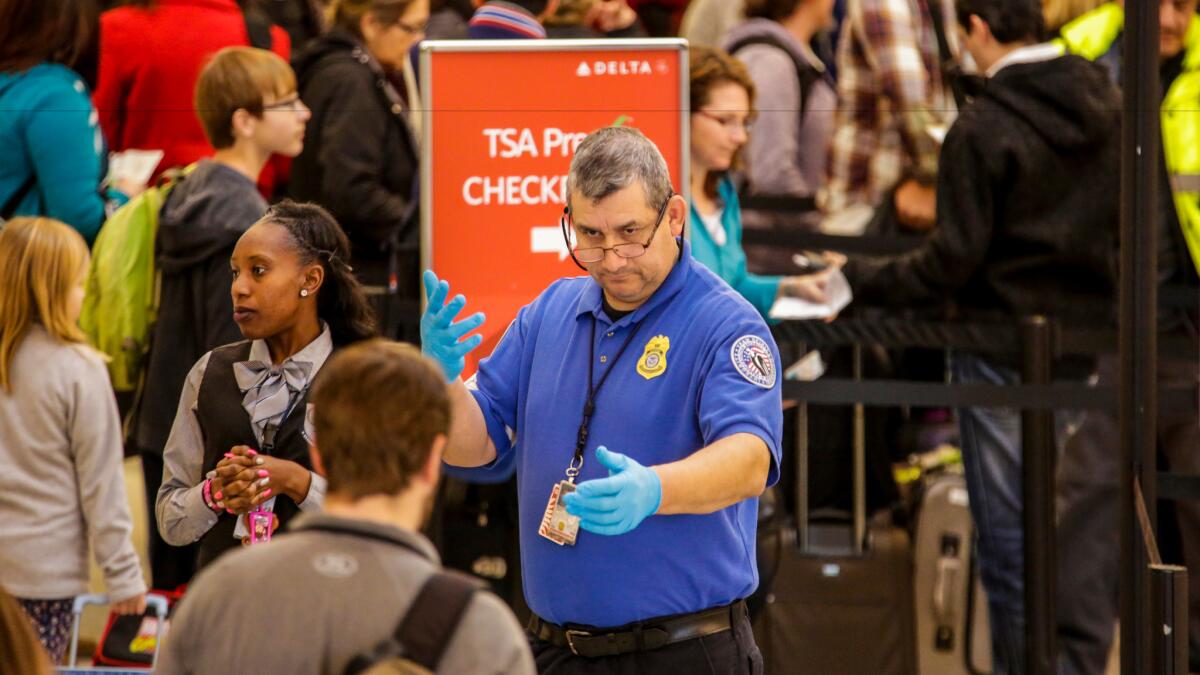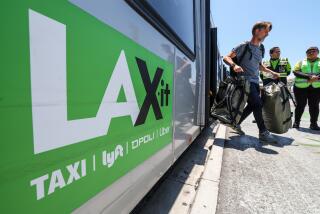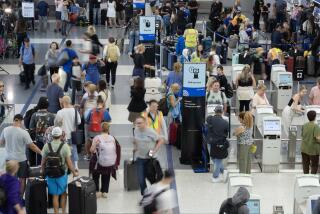Can Israeli-type security measures work at LAX and other U.S. airports?

- Share via
In the wake of two grisly attacks on European airports, one name has been on the lips of U.S. lawmakers and airport executives: Ben Gurion International Airport.
The airport near Tel Aviv, named for Israel’s first prime minister, David Ben-Gurion, has a reputation as one of the world’s most secure airports, where layers of security measures have kept the facility free of hijackings and terrorist attacks since the 1970s.
U.S. airport executives and lawmakers have increasingly debated whether the security measures used at Ben Gurion could prevent the kind of bloodshed that took place in the Brussels and Istanbul airports this year. Those measures include widely accepted passenger profiling based on appearance and behavior, multiple security screenings in the terminal and checkpoints in the general vicinity of the airport.
Ben Gurion hosted a conference last month attended by airport officials from more than 40 countries to learn about the airport’s security tactics, and former Ben Gurion security officials have testified several times at U.S. congressional hearings over the last few years.
“A lot of what the Israelis are doing has informed what we’re doing,” Peter Neffenger, administrator of the Transportation Security Administration, said during a senate committee hearing on airport security last month.
But to adopt most or all of Ben Gurion’s security measures at a facility like Los Angeles International Airport likely would mean higher ticket prices to pay for extra screening measures and longer wait times for more intense questioning by security agents, aviation experts say.
At Ben Gurion, travelers are told to arrive at least three hours before any flight, while U.S. officials recommend fliers arrive two hours before a domestic flight.
As it is, even a two-hour wait for security screening raises protests among U.S. travelers.
“In Israel, they have a security mentality,” said John Halinski, a security consultant and former deputy administrator at the TSA. “They are willing to accept a lot of things that American travelers are not willing to accept.”
Several polls, including the annual JD Power airline satisfaction survey, show that passenger satisfaction levels drop significantly if travelers must wait 15 minutes or longer for a boarding pass.
“It would be ideal to adopt the Israeli process for security, but it’s about risk versus return on investment,” said Johnathan Tal, a former anti-terrorism security specialist for the Israeli government and president and chief executive of Tal Global, a San Jose-based security firm.
Another problem is sheer size: LAX served 74 million passengers last year, while 16 million travelers passed through Ben Gurion.
Still, huge passenger numbers are not a barrier to adopting sound security measures, said Rafi Ron, president of New Age Security Solutions and former director of security at Ben Gurion airport.
“That is one of the typical excuses that people use when they don’t want to go into greater investment or adopt a more far-reaching approach to security,” he said. “It’s not a valid excuse.”
Oversight of airport security measures also differ.
In the U.S., the responsibility for airport security is shared by local airport police and the TSA.
At Ben Gurion, the responsibility for security falls under the airport manager and the airport’s security director, eliminating bureaucratic red tape when changes are needed and finger-pointing when problems arise.
“Everything goes under that umbrella,” Ron said.
Travelers also are questioned more often, starting more than a mile outside of the Israeli airport, where all incoming vehicles are stopped and inspected for car bombs and other weapons. The drivers and passengers also are questioned.
At LAX, police sometimes operate a vehicle checkpoint on the ramp leading into the airport but the dates, times and duration of the checkpoint operation are determined randomly by a computer program to ensure terrorists don’t know when to expect the checkpoint.
At Ben Gurion, armed security agents patrol the airport property and terminals with the authority to stop and question any passenger and demand to see identification and other documents. The security agents are typically former members of the Israeli military who have been known to ask travelers to show hotel receipts or even open their email accounts to prove they are who they say they are.
Since 2007, the TSA has operated a similar program staffed by “behavior detection officers,” specially trained TSA agents who question passengers acting suspicious or looking nervous.
But the program has been under attack by civil rights groups and members of Congress who question whether the tactics are effective and whether the officers target minorities. TSA officials defend the program, saying it does not profile travelers based on race or ethnicity.
In the face of such criticism, the TSA reduced the number of behavior detection officers to 2,660 from 3,130 in the last year and cut the number of airports where they serve to 87 from 122. The program is still in place at LAX.
But in Ben Gurion, security experts say race and ethnicity are among several factors used to determine who should undergo extra questioning.
“It is absolutely true that you are profiling on risk factors, and appearances are one of those factors,” Tal said.
After questioning travelers at Ben Gurion, security agents affix a yellow sticker on each traveler’s passport, showing 10 numbers, with the first digit ranging from 1 to a 6. A “1” represents a low-risk traveler, and “6” represents an extreme threat. The higher the number, the greater scrutiny a passenger can expect, according to several travelers who have flown through Ben Gurion.
Tal declined to comment on the 10-digit number system.
Ben Gurion also puts luggage through extra screening. Passenger luggage at Ben Gurion is screened when travelers enter the terminal, even before getting a boarding pass, and again after travelers get their boarding passes and go through the security checkpoints.
At LAX, luggage is screened only once, after passengers get their boarding passes.
Adopting the Israeli-style security measures would increase the time it takes passengers to clear security screening in the U.S. unless airport fees are raised to pay for extra screening agents to perform the added measures, aviation experts say.
Instead, the TSA has cut back on screeners in the last year, which explains why the wait times at airports surged at the start of the busy summer travel season, said J. David Cox, president of the American Federation of Government Employees, which represents TSA agents.
The TSA now employs about 42,000 screeners, down from 47,000 in 2013. Meanwhile, the number of passengers flying through U.S. airports has jumped 15%, to 740 million a year from 643 million, in that same period. Congress has approved funding to speed up the hiring of 600 new TSA agents and convert hundreds more officers from part-time to full-time employees.
“If you increase the security, you are going to have to increase the staff,” Cox said. “It goes hand in hand.”
To read more about the travel and tourism industries, follow @hugomartin on Twitter.
ALSO
SpaceX launches supplies to the International Space Station and lands rocket booster
Congratulations, Theresa May. Now mind that ‘glass cliff’
As need grows for painkiller overdose treatment, companies raise prices
More to Read
Inside the business of entertainment
The Wide Shot brings you news, analysis and insights on everything from streaming wars to production — and what it all means for the future.
You may occasionally receive promotional content from the Los Angeles Times.











